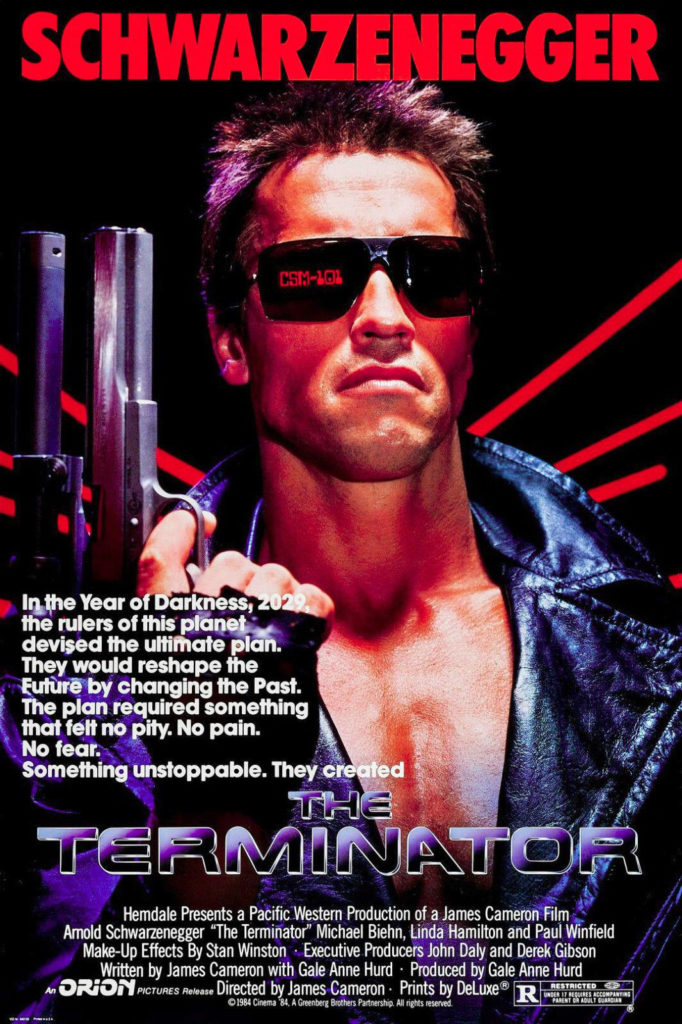Is The Terminator the best movie Arnold Schwarzenegger has ever been in? There’s a strong possibility that it is. Some viewers have an affinity for Terminator 2, others for Conan the Barbarian. As for me, I voted with my eyes a long time ago. Of all the films Arnold has made, The Terminator is the one I’ve watched the most. It is impossible for me to recall just how many times I’ve seen it, but I would not be surprised if it’s somewhere in the 20s, maybe even the 30s. So, pardon me while I gush.
Arnold had already starred as Conan by the time The Terminator reached theaters, but it is this role, as the eponymous killer cyborg, that has resonated the most throughout his career. Considering he’s not the star of this picture, that is saying something, indeed.
Most of my Loyal Seven are probably familiar with the broad strokes of the Terminator universe, but let’s run through it anyways. In the not too distant future, a computer network dubbed Skynet becomes sentient. Within a split second, it decides that humanity is its mortal enemy and must be destroyed. This is a bad thing. Skynet isn’t just some cloud computing software or computer virus. Oh, no. Skynet is a defense network with access to the nuclear arsenal of the United States. It launches all our nukes, every other nuclear nation responds, and doomsday has arrived. From the rubble rise the machines, controlled by Skynet, who continues to wage war on the survivors.
A group of rebels, led by John Connor, not the most creative fictional name ever, have Skynet on the ropes after a long and bloody war against its robot army. Facing defeat, Skynet tries a desperate gambit, sending one of its cyborgs back in time to 1984 Los Angeles, in a bid to find John Connor’s mother and kill her before she has a  chance to have her child. Connor learns of the plot, and sends one of his most trusted soldiers, Kyle Reese, back in time to protect his mother, right before the time machine blows up and renders all plot holes moot. Seriously, I recommend not spending too much time thinking about Skynet. That’s a lot of backstory, and other than the movie’s brief intro before the credits, a viewer is let in on none of it until later in the movie.
chance to have her child. Connor learns of the plot, and sends one of his most trusted soldiers, Kyle Reese, back in time to protect his mother, right before the time machine blows up and renders all plot holes moot. Seriously, I recommend not spending too much time thinking about Skynet. That’s a lot of backstory, and other than the movie’s brief intro before the credits, a viewer is let in on none of it until later in the movie.
Part of me wishes I could see this movie again totally fresh, unaware of the reasons behind Arnold’s and Reese’s sudden appearance in L.A. And now, dear reader, so do you, especially if I just spoiled the backstory for you.
Both the terminator and Reese (Michael Biehn) locate Sarah Connor (Linda Hamilton) at the same time. After this, the film doesn’t let up. The terminator, being a machine, has a programmed task, and short of being damaged beyond repair, will spend all of its time and energy pursuing Sarah Connor. Director and screenwriter James Cameron was aware of the urgency with which he had imbued his bad guy, so at any time in the movie when the main characters find themselves in some sort of comfort or relaxed disposition, a viewer can be sure the terminator will be making another appearance for a lengthy action sequence.
Despite being shot on a short budget, Cameron worked magic. The action sequences had to work within the constraints of the available money, so they stay close in and taut. The movie has an outlandish story behind it, but the characterizations make it believable. Arnold is naturally stiff in front of the camera, especially this early in his career. The marvel of his performance isn’t that he’s playing a cyborg, it’s that his portrayal of the cyborg resides in the uncanny valley. The Terminator looks and acts human, but it’s just enough of an imitation that it unsettles the viewer. There’s something off about the terminator that lets our subconscious know he’s not one of us. Other than the fact he kills just about every person he meets, I mean. There’s a strong contrast between the terminator and Sarah and Reese. These two are clearly human, betraying their stress and fear with just about every moment that passes by. Sarah because she is being hunted by an unstoppable killing machine, and Reese because he’s been given a mission whose success or failure will decide the fate of humanity.
At heart, The Terminator is a simple film, but that backstory gives it an underlying depth that propels the story along with just as much urgency as the action. Unlike so many action films of the 1980s, many of them involving Arnold, there is purpose here. Because this film was never meant as a star vehicle for Arnold, the story was always more important than its hulking costar. James Cameron was an untapped resource of storytelling prowess at this point in his career, and The Terminator was the film that launched a deservedly phenomenal run. This isn’t just a great action or sci-fi flick. This is a great film.
